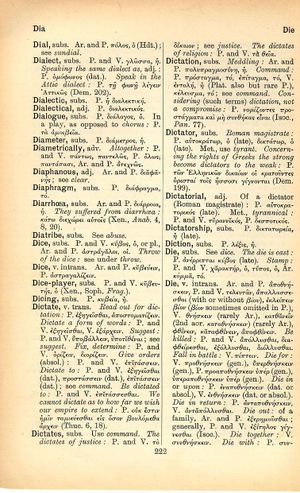die
κακὸς μὲν γὰρ ἑκὼν οὐδείς → no one is voluntarily wicked, no one is voluntarily bad
English > Greek (Woodhouse)
subs.
See dice.
The die is cast: P. ἀνέρριπται κύβος (late).
Stamp: P. and V. χαρακτήρ, ὁ, τύπος, ὁ, Ar. κόμμα, τό.
v. intrans.
Ar. and P. ἀποθνήσκειν, P. and V. τελευτᾶν, ἀπαλλάσσεσθαι (with or without βίου), [[ἐκλείπω |ἐκλείπειν]] βίον (βίον sometimes omitted in P.), V. θνήσκειν (rarely Ar.), κατθανεῖν (2nd aor. καταθνήσκειν) (rarely Ar.), φθίνειν, καταφθίνειν, ἀποφθίνειν.
Be killed: P. and V. ἀπόλλυσθαι, διαφθείρεσθαι, ἐξόλλυσθαι, διόλλυσθαι.
Fall in battle: V. πίπτειν.
Die for: V. προθνήσκειν (gen.), ὑπερθνήσκειν (gen.), P. προαποθνήσκειν ὑπέρ (gen.), ὑπεραποθνήσκειν ὑπέρ (gen.).
Die in or upon: P. ἐναποθνήσκειν (dat. or absol.), V. ἐνθνήσκειν (dat. or absol.).
Die in return: P. ἀνταποθνήσκειν, V. ἀνταπόλλυσθαι.
Die out: of a family, Ar. and P. ἐξερημοῦσθαι; generally, P. and V. ἐξίτηλος [[γίγνομαι |γίγνεσθαι]] (Isoc.).
Die together: V. συνθνήσκειν.
Die with: P. συναποθνήσκειν (absol.), συναπόλλυσθαι (absol.), Ar. and V. συνθνήσκειν (dat.), V. συνόλλυσθαι (dat.), συνεκπνεῖν (dat.).
Die a lingering death: P. δυσθανατεῖν.
Dying a lingering death: V. δυσθνήσκων.
Latin > French (Gaffiot 2016)
dĭē, gén. et dat., v. dies.

